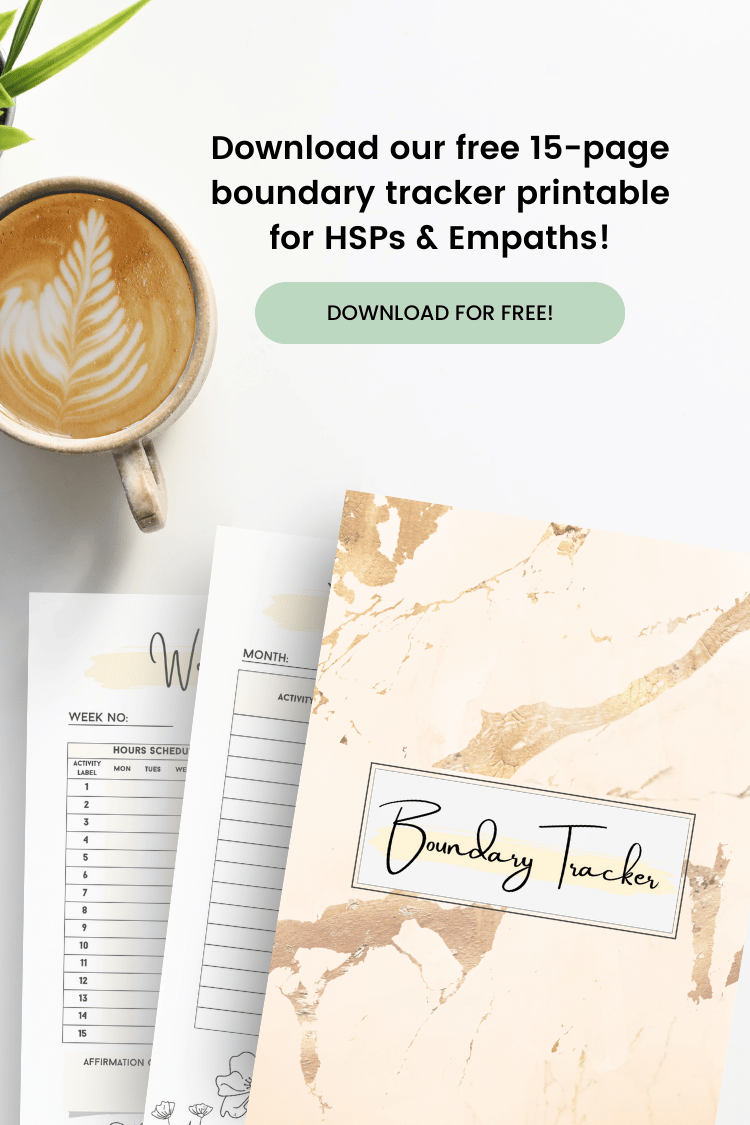Wondering how to stop taking things personally and find more peace within? In this article, we offer some practical solutions!
Just a little heads up: some of the links in this blog are affiliate links, which means if you click on them and make a purchase, we may earn a small commission at no additional cost to you. 😊
We only recommend products and services we genuinely believe in and have personally used or researched. Your support through these links helps us keep bringing you valuable content, so thank you for being amazing!
Estimated reading time: 7 minutes
As a highly sensitive person, it can be easy to take things personally. You may feel that other people’s words or actions are directed at you, even if they aren’t.
This can lead to feelings of hurt, frustration, and even anger, which can make it difficult to maintain healthy relationships with others.
However, there are practical tips you can use to stop taking things personally and learn to care less about what other people say.
In this article, we’ll explore some of the typical signs of taking things personally and provide solutions to help you overcome this common challenge.
Here’s What You’ll Learn
Common Signs That You’re Taking Things Personally
As a highly sensitive person, you may find yourself constantly taking things personally. It can be challenging to separate yourself from the words or actions of others, but it’s important to learn how to care less about what other people say.
Some common signs that you’re taking things personally include:
- Getting defensive or upset when someone criticizes you;
- Feeling hurt or offended by minor comments;
- Feeling like others are intentionally trying to hurt your feelings;
- Obsessing over negative interactions with others.
If any of these signs resonate with you, it’s time to work on letting go of the things you can’t control.
Understanding Why You Take Things Personally
Taking things personally is a common struggle for highly sensitive people. Due to their deep empathic nature, highly sensitive people care deeply about others and their opinions. As a result, it is natural to take things personally from time to time.
It’s normal to get affected by criticism or confrontation, but when it starts impacting your emotions and beliefs, it becomes an issue.
To stop taking things personally, you need to acknowledge the impact of negative self-talk on your insecurities and beliefs. Becoming aware of your triggers can also help you recognize when you’re overreacting. Moreover, learning how to respond appropriately instead of reacting impulsively out of fear or anger is a valuable communication skill to acquire.
By focusing on motivation and positive reinforcement, you can replace negative thoughts with more optimistic ones that build up rather than tear down your confidence as a highly sensitive person.
Identifying Your Triggers
Reflecting on past experiences that caused emotional reactions, noticing patterns in triggering situations and making a list of people or behaviours that trigger your sensitivity can help you identify your triggers. By acknowledging what causes you to take things personally, you can gain awareness and become motivated to change negative beliefs about yourself.
Here are some tips for identifying your triggers:
- Reflect on past experiences where you had strong emotional reactions;
- Notice patterns in situations where you tend to feel afraid or insecure;
- Make a list of people or behaviours that trigger your sensitivity.
Confrontation with our triggers can have a negative impact on us if we don’t understand them. Once identified, we need to accept them as normal insecurities instead of letting them control us.
Recognizing Negative Self-Talk
Paying attention to the inner monologue you have with yourself is essential in recognizing negative self-talk. Acknowledge any negative beliefs or insecurities that may be impacting your motivation and emotions.
Confrontation can also help challenge negative thoughts by examining evidence that contradicts them. Replace these thoughts with positive ones, focusing on self-compassion and forgiveness. Here’s how to do that:
- Pay attention to your inner monologue;
- Challenge negative thoughts;
- Replace negativity with positivity;
- Practice self-compassion and forgiveness.
Understanding the impact of negative self-talk is normal for highly sensitive people who often feel afraid or insecure about their actions or words. By being aware of our own thought patterns, we can take control over them and shift towards a more positive mindset.
Understanding Your Emotions
As a highly sensitive person, it’s important to acknowledge that it’s okay to feel emotions deeply. However, overwhelming emotions can be difficult to cope with. Learning healthy coping mechanisms such as meditation, exercise, or journaling can have a positive impact on mental health and well-being.
Learning healthy coping mechanisms such as meditation, exercise, or journaling can have a positive impact on mental health and well-being.
During intense emotional situations, focusing on the present moment and grounding techniques can help reduce anxiety and fear.
It’s important to recognize your beliefs and insecurities that may contribute to taking things personally. Confrontation is not always necessary; sometimes motivation comes from within when we learn how to care less about what others say.
By practicing awareness of our emotions and implementing healthy coping mechanisms, we can take control of our reactions instead of letting them control us.
Learning How to Care Less
One of the key ways to stop taking things personally as a highly sensitive person is by practicing mindfulness. This involves paying attention to your thoughts and feelings without judgment or reaction. By becoming aware of your emotional triggers, you can learn how to respond in a more calm and rational way.
Another effective method is building self-confidence. Focus on your strengths, accomplishments, and positive qualities instead of dwelling on criticism or negative feedback.
Remember that no one is perfect and it’s okay to make mistakes – they’re opportunities for growth and improvement. By valuing yourself, you’ll be less likely to take things personally when others don’t see eye-to-eye with you.

Practicing Mindfulness
Mindful breathing exercises can be a valuable tool for highly sensitive people who tend to take things personally. Start by focusing on the sensation of your breath moving in and out of your body. With each inhale, imagine drawing in calm and relaxation, while with each exhale, you release tension and negativity.
Observing thoughts without attachment is another mindfulness technique that can help you stop taking things personally. Rather than getting caught up in negative self-talk or reacting emotionally to situations, simply observe your thoughts as they arise without judgment or attachment.
Body scanning meditation involves paying close attention to the physical sensations throughout your body from head to toe. This practice helps you stay present in the moment and tune into what’s happening internally rather than getting lost in external stressors that may trigger personal feelings.
Here’s a powerful body scanning practice you may want to try:
Building Self-Confidence
To build self-confidence as a highly sensitive person, there are several things you can do. First, try practicing positive affirmations to boost your self-esteem and challenge negative beliefs about yourself. Recognizing your achievements and strengths is also important in building confidence.
Another key aspect of building self-confidence is challenging negative self-talk. When you catch yourself engaging in negative thoughts or feelings about yourself, replace them with positive affirmations or counterarguments. By doing this consistently over time, you’ll begin to develop a more positive mindset and stronger sense of self-worth as a highly sensitive person.
Setting Boundaries
Identifying Personal Limits and Values is crucial in setting effective boundaries that protect one’s emotional well-being. It involves taking the time to understand what matters most, so you can communicate it assertively and respectfully with others.
When faced with requests that do not align with your priorities, Saying No becomes much easier when you are clear on where your limits lie. Remember, setting boundaries is a sign of strength – not weakness – as it allows for healthier relationships and increased self-respect.
Learning to Let Go
We know that letting go is easier said than done, but it is worth to give it a shot. To learn how to let go, it’s important to practice forgiveness towards oneself and others.
Holding onto grudges can weigh heavily on the mind and body, leading to increased stress levels. Instead of obsessing over the uncontrollable, focus on what can be controlled. This means accepting that not everything will go as planned and embracing challenges as opportunities for growth.
Adopting a growth mindset is key to letting go of things outside our control. By viewing obstacles as chances for learning and development, we can approach situations with a positive attitude. Remember that mistakes happen, but they don’t define us or our worth as individuals. Letting go takes time and effort but is worth it for personal growth and improved overall well-being.
Seeking Professional Help
If you’re struggling with taking things too personally, seeking professional help can be a great option. Counselling or therapy sessions can provide a safe space to discuss your emotions and learn coping mechanisms.
Joining support groups within your community can also create a sense of belonging and offer valuable insights from others who understand what you’re going through.
Finally, speaking with HSP experts can provide specialized guidance on how to navigate the world as a highly sensitive person. Remember that it’s okay to ask for help when you need it – taking care of yourself is important!
Some Final Remarks
We understand how challenging it can be to stop taking things personally, but trying some of the above mentioned suggestions may help you to feel happier and more balanced as a highly sensitive person.
We’re curious: in what situations do you tend to take things personally? Feel free to share your experience with us in the comments.








